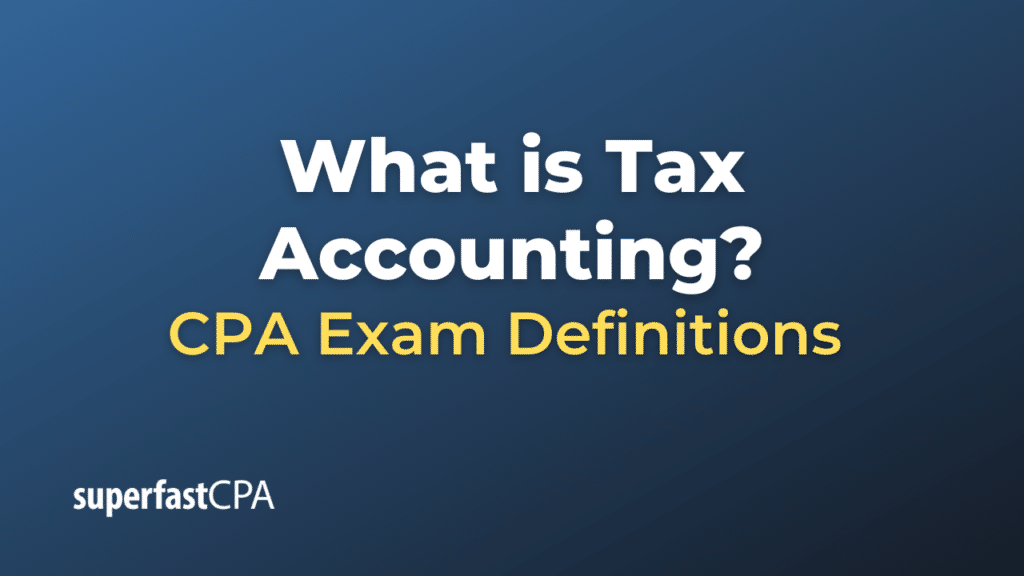Tax Accounting
Tax accounting refers to the rules, procedures, and methods used to prepare tax returns and determine a taxpayer’s liability in accordance with the tax laws and regulations of a specific jurisdiction. While general financial accounting is concerned with presenting financial information to external users (e.g., investors, creditors), tax accounting focuses specifically on reporting information and transactions to tax authorities in the format and manner they require.
Key aspects of tax accounting include:
- Tax Compliance: This involves ensuring that all required tax returns are prepared accurately and filed on time. This includes income tax returns, sales tax returns, payroll tax returns, and any other tax-related forms that must be submitted to tax authorities.
- Tax Planning: Tax accountants engage in proactive planning to minimize a taxpayer’s liability, within the bounds of the law. This might involve strategic decisions regarding investment, timing of income and deductions, selection of the type of business entity, and more.
- Interpretation of Tax Laws: Tax codes can be complex and are frequently changing. Tax accountants need to interpret these laws to ensure that their clients or employers are compliant and to understand the implications of various business decisions.
- Record Keeping: Proper documentation is critical in tax accounting. Taxpayers must keep records to support the income, deductions, and credits claimed on their tax returns. In case of an audit by tax authorities, these records can be invaluable.
- Research and Analysis: Tax accountants often need to research specific tax issues or stay updated on changes in tax law to provide accurate advice or make informed decisions.
- Reconciliation of Financial and Tax Accounting: Because tax accounting and financial accounting rules can differ, tax accountants may need to reconcile the company’s financial statements with its tax returns. This might involve adjustments for items like depreciation methods, which can differ between the two accounting systems.
Tax accounting can vary significantly between jurisdictions due to differences in tax laws. Moreover, in some regions, there can be multiple layers of taxation—federal, state, and local—that each have their own rules and regulations. As a result, tax accounting requires specialized knowledge and is an essential subset of the broader accounting profession.
Example of Tax Accounting
Here’s a hypothetical example illustrating some aspects of tax accounting:
Scenario: Luna’s Tech Corp, a tech startup, has just finished its first financial year and needs to prepare its tax returns. They hire David, a tax accountant, to assist.
1. Tax Compliance:
- David collects all the financial records for the year from Luna’s Tech Corp.
- After a thorough analysis, he prepares the corporate income tax return, ensuring that all income is reported and that allowable deductions are claimed.
2. Tax Planning:
- Luna’s Tech Corp plans to purchase new servers next year. David advises them to do so at the beginning of the year to maximize their depreciation deductions for the year.
- David also suggests setting up a retirement plan for employees, which will not only benefit the employees but also provide tax benefits to the company.
3. Interpretation of Tax Laws:
- Luna’s Tech Corp developed a new software product and wants to know if they qualify for the Research & Development (R&D) tax credit. David reviews the tax laws, determines the software development qualifies, and calculates the credit amount.
4. Record Keeping:
- David emphasizes the importance of keeping detailed records, especially for items like business expenses that were deducted.
- He introduces Luna’s Tech Corp to tax software that can help them maintain records seamlessly.
5. Research and Analysis:
- The company received some income from overseas sales. David researches tax laws concerning foreign income to ensure it’s reported correctly and to determine if any tax treaties might apply.
6. Reconciliation of Financial and Tax Accounting:
- Luna’s Tech Corp uses the straight-line method for depreciation in its financial accounting. However, for tax purposes, David uses an accelerated depreciation method, as allowed by the tax code.
- David makes the necessary reconciliations and adjustments between the company’s financial statements and its tax return.
By the end of this process, Luna’s Tech Corp not only has a completed and compliant tax return but also a strategic plan for the upcoming year, all thanks to the expertise of their tax accountant, David. This example illustrates the multifaceted role tax accounting plays in the financial landscape of businesses.













